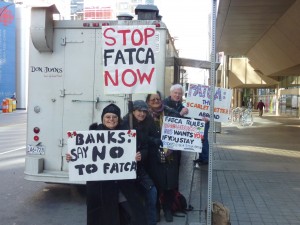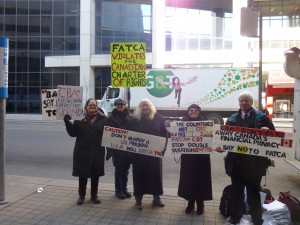photo from yesterday, day 1 of protest
PROTEST EVENING POSTMORTEM:
I know that this small protest did reach the FIsters attending the conference and put them on notice–because most refused to look us in the eye.
This protest happened because of the dedication of on-site protesters including Atticus, Marie, Northernstar, Peter, Tricia, and WhiteKat, those (including Blaze and James Jatras) who helped in preparation of the letter to the Canadian Bankers Association that was critical to the protest, and because of the others I am not certain that I can mention.
Amazing people, all.
On-site coverage from IRSCompliantForever :
15.54. A last goodbye from all of us to the banksters.
15:03. Banker from small bank who hates FATCA just signed petition.
14:24. AttIcus just explained FATCA to passerby. Response was “Well, the banks need a little (words deleted).”
14:14. Banksters we meet all express sympathy but insist that there is no way to prevent FATCA. So many passerbys wondering about this FATCA word.
13:18. Fellow from one of the major banks visited with us had a friendly chat and accepted the CBA letter. He asked that we not disclose the name of his bank. Banksters are also taking pictures of us.
12.55. Another passerby came up to us expressing concern that her daughter has a Green Card.
Reports and photos of earlier today and yesterday after the jump
12:53. A passerby just came up to us expressing concern that she was born to a US parent and asked whether FATCA applied. Atticus explained and the woman thanked us for being here.
11:23. Unexpectedly another protester arrived with signs. Someone we all know.
11:13. Police have arrived again.
10:51. Nice sunny day. One bankster inside gave us the thumbs up. We had a nice chat with two reps of a major FI who accepted the CBA letter.
***
Day 1 of Protest – Yesterday, 13 November
13:40. Stuck on a narrow curb.
13:07. New development. Head of security informed us that we had to move to the curb in which we must remain 18 inches from the street. I called the police to resolve. Three police officers came and tried to intervene with security, but security refused as walkway is technically on private property. Want to emphasize that police tried their very best to help us. We will try not to tip over on curb. Lots of interest from passerbys. Morale very high.
12:50
12:46
12:13. Above is a photo of four Brocker/Sandboxers taken by a sympathetic passerby. Note that the person holding the “Do not marry an American” sign is a guest Brocker who is a kindly non-US spouse of a US person. She strongly supports the message of the sign and wants to be known as @LauraSecord. Small group but morale is high.
11:09. Met a fellow working for a bank. He says FATCA is painful.
11:02. Tricia, Marie, NorthernStar and IRSCompliantForever just spoke to a very friendly and receptive journalist who will include mention of our protest in an article He also said that this is the first FATCA protest he is aware of. We cannot mention name of journalist. We are pointing signs at the conference room. Doors are closed now so that banksters cannot see us.
09:37. Peter is standing immediately in front of the conference meeting room. We can see them and they can see us. But we cannot enter.
07:33. Peter and I are on site. We were told us that we would be arrested if we entered building. Tried to leave CBA letters but conference organizer refused and noted that our comments on IBS about CBA were inflammatory.
***
The conference is “Canadian Institute’s 19th Annual REGULATORY COMPLIANCE for Financial Institutions” at the North Building of the Metro Convention Centre in Toronto which has been brought to our attention through the diligence of @Tricia. http://www.regulatorycomplianceforfis.com/













Thank you, badger. I hope that you get an answer.
I still want to know from JEG, from my Canadian government, from my Canadian bank(s), why collateral damage (in this case from FATCA) is accepted US and now Canadian policy — the cost of doing business.
I have fixed the broken Scotiabank links in badger comment.
Only a Canadian,
I appreciate JEG comments here as well, if only for me to try to understand the thinking of business persons and government putting ‘cost of doing business’ before the rights of citizens, actually negating those rights to enable business, the shareholders dividends, the economy.
What do the rights of he Canadian Charter of Rights and Freedoms actually mean for any Canadian — not just for FATCA? Everyone needs to pay good attention — what seems to be happening here, our Canadian government and banks waiving the rights of approximately one million Canadians because of their “US personhood,” will happen in other situations. It will be history repeating itself. This should be a wake-up call; why isn’t it?
@badger
You are asking some very specific legal questions, which I am totally incapable to answer or even begin to address. I am happy to admit that I have no training of any sort in constitutional law.
What I would say however is that banks or other financial institutions do not make laws. It is the prerogative of the legislature(s), the government and eventually the courts to create, apply and enforce legislation, respectively. This brings me back to the my very initial point on this thread: if your interest is to see your legal rights applied, then your actions should really be targeted to entities with legal authority.
@Only a Canadian
Thank you for your very considerate reply.
I am actually far less pessimistic than you about the ability to implement the pass-through rules, but I fully accept that it is a matter of personal judgment at this stage. I cannot imagine that a participating FFI would risk incurring criminal liabilities for failing to apply the rules, even if, as you said, the likelihood of getting caught in IRS enforcement is relatively low. It is probably also worth remembering that in countries that have signed IGAs, compliance will not be monitored and enforced primarily by the IRS but by the local banking regulator (for instance the FCA in the UK, BAFIN in Germany, etc.).
@ J.E. Gutierrez,
I am happy to hear you say: ‘I am happy to admit that I have no training of any sort in constitutional law’. This means we have an excellent chance at killing FATCA in Canada when/if we are forced to take the next step, which will be a court challenge.
In the meantime we will do everything we can to protest against both the Canadian government, and Canadian banks who are collaborators and enablers in the enforcement of a foreign law (FATCA) on Canada; a law which is a clear violation of our Canadian Charter of Rights and Freedoms, not to mention a world wide human rights violation.
@northernstar and calgary411, thanks for finding and fixing the link.
@nobledreamer, happy to try to challenge sophistry.
@JEG: I noticed you conveniently ignored my question about whether your ancestors were stalked for taxes, tax reporting and private financial records by their homelands. I know mine weren’t. Did their banks and U.S. government cooperate in passing that information to a foreign government?
If they did have their information turned over under threat of closure of their legal bank accounts, please enlighten us on what their reaction was. Did they think this was just fine and dandy? Or did they object to the U.S. government? Or could they possibly have objected to their banks?
Did they pursue court action? If so, what did the Supreme Court say about such treatment of naturalized U.S. citizens and their joint accounts with their American-born spouses and children.
If your ancestors weren’t treated that way, why in the world do you think we should be?
Perhaps U.S. Treasury will do such an outstanding sales job, Cuba, Russia, China, Iran and Eritrea will decide FATCA is a fabulous idea. Then, they will demand the same information on naturalized American citizens born in those countries as true reciprocity–along with that of their American-born spouses and children.
What would U.S. Supreme Court say about that?
Even though you have no training in constitutional law, I think any rational person could predict what U.S. Supreme Court would say.
You have shared a great deal of information with us. If you don’t mind, I will respect the opinions of Canada’s top two constitutional lawyers over yours when it comes to Canada’s Charter of Rights and Freedoms.
The problem is simple. It’s a conflict of two good causes. One side wants to do more to prevent tax evasion and the other side wants to do more to protect the innocent. Those fighting against tax evasion feel that their battle requires harming the innocent, while those protecting the innocent are standing in the way of those fighting against tax evasion. Thus, the opponents of tax evasion are seeking to trample on human rights to oppose the defenders of the innocent. Somehow, one needs to find the middle ground. Technically, both sides should be working together to achieve the same goal, but sadly such isn’t happening. The reason why this is not happening is because the US has a long history of having a horrible foreign policy due to ist lacking cooperation with ist expat population, caused by its tax policy which conflicts with its human rights laws prohibiting national origin discrimination. So, all of this is basically an American conflict of American interests. Americans are fighting against Americans to gain what they actually oppose.
Personally, I think it’s important to make views known to all parties.
I’ve seen a suggestion that it is the obligation of the board of directors to ensure FATCA compliance so as to protect the shareholders and other rights holders. While I think the board does have that duty, I believe it has a more fundamental duty and that is to minimise the costs of the bank and to maximise the profits and, therefore, to fight against FATCA. In that context, it seems to me that the CBA and Canadian banks encouraging the Canadian government (and the governments of other jurisdictions in which the banks do business) to lodge a complaint against the US with the World Trade Organisation would be a damn sight cheaper than trying to shave a couple million off a $100 million compliance bill for large bank by pushing for an IGA.
FATCA imposes $10s-100s of billions of extra compliance costs onto the hundreds of thousands of FFIs for a miniscule benefit which accrues only to the US. The US banks also largely escape any compliance costs since FATCA IGAs aren’t reciprocal. The penalty structure for non-compliance is also wildly different with an FFI subject to million/billions/trillions in “withholding” on US source or pass-through payments (the latter being outright theft at the behest of and benefit for the US) while a US bank gets hit with a $100 fine. Is FATCA a compliance tax? Is it a reverse subsidy for US banks to give them a distinct cost advantage? Is it a giant trade barrier for gaining access to US capital markets products? Who knows, but it should be the WTOs job to figure these things out.
There have been 469 disputes brought to the WTO since its inception in 1995. Of these, Canada has filed a dispute against the US 15 times on issues such as Countervailing Duties with respect to Live Cattle (DS 167) Reclassification of Certain Sugar Syrups (DS 180), Export Restraints as Subsidies (DS 194) and a string of disputes on softwood lumber. The EU has brought 32 cases against the US on issues such as Solid Urea from the former East Germany (DS 63), Foreign Sales Corporations (DS 108), and a US Harbour Maintenance Tax (DS 118). Korea (10), Brazil (10), Japan (8) and India (8) have also brought complaints against the US. The US has been respondent in 120 cases and a complainant in 106 (http://www.wto.org/english/tratop_e/dispu_e/dispu_by_country_e.htm). Wouldn’t it be nice if the financial services industry was at least as important as the live cattle, sugar syrup or softwood lumber industries are to Canada or the solid urea industry in the former East Germany is to the EU?
@Edelweiss
My understanding is that the current WTO agreements do not cover trade in financial (and other) services. If this is the case, the WTO would not have jurisdiction to arbitrate over FATCA-related disputes.
Is my understanding incorrect?
If all JEG cares about are the bank’s shareholders, maybe he’s just worried about the possibility of a run on the banks if an IGA looks like it’s in jeopardy.
@J.E. Gutierrez, a search on WTO.org for “foreign account” returns 3870 entries. “Tax Evasion” is mentioned 293 times. “Transparency” 6450 times. “Banking secrecy” 68 times.
Is FATCA trying to reinvent the wheel?
@JEG
Would you know whether in the absence of an IGA, the application of 30% withholding would constitute a NAFTA violation?
@bubblebustin, Switzerland showed us that banks were the reason why the government threw human rights out the window in favor of FATCA:
Translation: Outside of the propaganda fuss of the bank lobby, there is not a single reason to surrender documents to the United States.
Blame the banks.
@tdott
I do not know, although I seem to vaguely remember reading/hearing that cross-border taxation issues were not within the scope of NAFTA.
I would be very interested to hear if you find a better answer.
This one on NAFTA and cross border Taxation was written by a Canadian:
“The General Agreement on Trade in Services (known as the GATS) is an important new element in the
international framework that affects the regulation of every WTO Member’s financial sector.” (Paragraph 1 of the Abstract – “Foreign Banking: Do Countries’ WTO Commitments Match Actual Practices” published 2006 – http://www.wto.org/english/res_e/reser_e/ersd200611_e.pdf)
“The GATS has an admittedly wide scope. It applies to all measures by WTO Members affecting
trade in services. Services include any service in any sector, including financial services, but
excluding the so-called “services supplied in the exercise of governmental authority.” Financial
services have been defined in the GATS as including any service of a financial nature offered by
a financial service supplier, including all insurance and insurance-related services (e.g., direct
insurance, reinsurance, insurance intermediation, and auxiliary insurance services), as well as all
banking and other financial services (e.g., deposit taking, lending, financial leasing, asset management, trading in securities, and financial advice).” (first full paragraph, page 5, same document)
The phrase “services supplied in the exercise of governmental authority” is footnoted in the original. The full text of the footnote reads – “In the case of financial services, “services supplied in the exercise of governmental authority” are the following: 1) the activities conducted by a central bank or monetary authority or by any other public entity in pursuit of monetary and exchange rate policies; 2) activities forming part of a statutory system of social security or public retirement plans; and 3) other activities conducted by a public entity for the account or with the guarantee or using the financial resources of the Government. However, if a WTO Member allows any of the activities referred to in 2) and 3) to be conducted by its financial service suppliers in competition with a public entity or a financial service supplier, then they will be considered as any other “service”, and therefore subject to the GATS disciplines.”
@JEG Hmmm. You continue to avoid my question about your ancestors being stalked for taxes, tax reporting and financial information. Could it be because they weren’t? Just like mine weren’t.
To the best of my knowledge, none of our ancestors were. If they had been with support of U.S. government and US banks, I suspect U.S. Supreme Court would have had something to say about that.
You sound suspiciously like someone on Twitter named Mia LaChupacabra. Any relation?
@JEG,
I note again;
You repeated this rhetorical question on several threads here at IBS, and pose it as if you are asking my and other’s opinion;
..”The ordinary savers, shareholders and employees of Canadian banks have the same right to see their interests considered as the US persons affected by the implementation of FATCA, would you not agree?…”
I did not agree, and offered my concerns about Charter ‘rights’ and protections from discrimination based on parentage, birthplace and national origin, vs. investment, profit and salaried ‘interests’, you deflected my questions by saying that those were points of constitutional law with which you did not have expertise. I noted that we are also ‘ordinary savers’, and shareholders, and may also be employees of Canadian banks – groups you single out for our consideration. I noted that the population affected by FATCA is in fact much broader than that – and includes ALL Canadian taxpayers and ALL Canadian accountholders – including but not confined to us, who will pay in several ways for the significant, uncontrollable, unaccountable and uncalculated implementation, maintenance and future compliance costs that FATCA and the US demands. You declined to address that population and those costs.
I asked you your position on the rights of Canadian resident or citizen minors and those deemed incompetent – who are respectively delayed, and absolutely prohibited by the US from renouncing/relinquishing, as well as the rights of the NON-US joint account holders (ex. NON-US spouses, family members, business partners) whose assets will be disclosed to the IRS despite their lack of any US connection or legal obligation (other than their familial, marital or business relationships with us), you also declined to venture your opinion – despite your very forthright assertions to me and to others here that we should recognize the rights and competing interests of other parties affected by FATCA.
You decline to address the issue I find unacceptable and offensive – the actions of the banks to subvert the democratic process in Canada – lobbying secretly and being kept apprised of the FATCA IGA negotiations behind the backs of the Canadian taxpayers, accountholders, depositors, investors, citizens, voters and legal residents who will pay for and be bound forever by FATCA – a far-reaching extraterritorial law, enacted via an IGA whose terms the US will not be bound equally to or reciprocate, and which will be subject to the last-in-time-rule and any subsequent changes made by the US Congress – without consulting Canada.
You assert that we should only address those with the power to enact laws, but decline to acknowledge that the CBA and IIAC seek to influence the hands of those who write the laws, while preventing any public debate, and thus to deprive us of our rights as citizens, taxpayers and voters.
@Edelweiss
Thank you for posting this. It is a lot of “legalese” to digest, but it definitely looks like services are included under the WTO agreements, something I had not fully appreciated.
So maybe a challenge under WTO rule may be possible. I am obviouly not the right person to discuss this credibly any further.
@Blaze
I am not ignoring your questions/comments, but I fail to see what relevance my or your ancestors’ situation, or that of naturalized citizens of various origins, have with respect to my initial observation.
I simply commented that Canadian banks did exactly what could (and indeed should) be expected from them under the presnt circumsatances: they brought to the attention of the goverment (and the Canadian parliament) the existence of a significant conflict of law affecting their ability to conduct business, and asked for assistance in resolving it.
I have not attempted to take position with regard to your and other affected parties’ rights under Canadian constitutional law, as this is way beyond my area of (limited) expertise.
I am not a regular Twitter user.
@badger
I am truly confused by your latest entry here. I am actually the one who replied to a comment saying that ‘banks had thrown US persons under the bus’, that things were not that simple.
I suggested that the risks of non-compliance were very substantial (possibly terminal) for Canadian FFIs, and that their directors, entrusted the interests of all their institutions’ stakeholders, would find it impossible to view it as an appropriate course of action.
You (and some, let’s say, more forceful poster) approached the issue from a different angle, arguing that banks have an absolute duty to comply with Canadian constitutional law, notwithstanding the enormous risks that this creates for the solvency of the country’s financial system.
I do not believe that both approaches are mutually exclusive, and in fact the banks have never (as far as I know) indicated they intended to breach Canadian law to achieve compliance with FATCA. They however have made use of a very legitimate right to highlight the challenging situation they find themselves in, and asked the government to take the lead in finding an acceptable solution.
@J.E. Gutierrez, well, if so, then I’m glad that Canadian banks pointed that FATCA doesn’t need to be implimented and that the nations of the world can work together to pressure the US to modify its laws prohibiting national origin discrimination in order to force its banks to report the finances of the 11 million Mexican tax evaders living in the US to the Mexican authorities so that Mexico can tax their earnings along the concept of CBT which attempts to prevent individuals from gaining a tax advantage by relocating to tax havens such as the United States. If I was a Canadian bank, I would have done just the same.
@JEG, you continue to decline to address the issues you yourself raised here;
Your comment;
http://isaacbrocksociety.ca/2013/11/02/help-appreciated-for-nov-13-14-toronto-protest-against-fatca-complicit-banks/comment-page-14/#comment-676680
You made the following statement/rhetorical question;
..”The ordinary savers, shareholders and employees of Canadian banks have the same right to see their interests considered as the US persons affected by the implementation of FATCA, would you not agree?…”.
That is what I have referred to twice. I don’t agree, and have told you why.
Your reply above does not address my comments about making meaningful distinctions between ‘rights’ as conferred by the Charter vs. the “interests” of the banks, and subgroups (savers, shareholders and employees) you want to discuss. You make statements that represent or imply that the “interests” of banks, accountholders, shareholders, and employees are equivalent to ‘rights’.
We are also savers, and no doubt there are some who are also shareholders and bank employees. But first and foremost, we are ALL Canadian taxpayers and legal tax residents of Canada. All of us are by necessity accountholders. Many/most are also citizens and voters. ALL Canadian taxpayers and accountholders will pay the bill for FATCA. Only some (i.e. the CBA and IIAC) will consider that they benefit from a FATCA IGA. Therefore, ALL will bear the considerable costs, and only some will reap the ‘benefit’ (such as it is).
You do not acknowledge or address the issues I have raised, including:
– the offensiveness of the secretive behind the scenes lobbying and involvement of the CBA and IIAC to urge our government to sign on to an extraterritorial agreement that Canada cannot control or benefit from, but which will bind ALL Canadian citizens and residents forever and be paid for forever by ALL Canadian taxpayers and accountholders. You do not address my point that the CBA and IIAC seek to arrange for the outcome which they have decided is in THEIR best interests, regardless of the effect on ALL Canadian taxpayers and accountholders, citizens and residents, and without public debate or discussion. In fact, one FATCA update stated that most likely, the IGA is to be signed, without public notice until weeks or more after the fact.
You do not acknowledge that FATCA is based on criteria that discriminates against us based on parentage, birthplace/national origin as the only basis. You do not acknowledge that joint accountholders such as spouses and business partners, who are NOT US persons and who have NO legal or other obligation to the US Treasury/IRS (which does not take a degree in constitutional law to see) would have their personal and financial data transferred to the US and subjected to the US Patriot Act without recourse under a FATCA IGA. You do not acknowledge that FATCA layers yet another level of US tax compliance and penalty burden onto the registered savings of Canadian minors (RESPs deemed to be taxable ‘foreign trusts’) and also on the disability grants, income and RDSPs of Canadian dependents with disabilities which render them legally incompetent, and thus unable to ever be free of US extraterritorial double taxation. A FATCA IGA subverts the Canadian social policy and goals that registered savings were designed and intended to address.
It is very offensive for the CBA and IIAC to urge the Canadian government to a FATCA IGA that will determine the treatment of our personal, legal and primarily post-tax Canadian assets. We OWN the assets in the affected personal and business accounts. The CBA and IIAC do not. Thus we do not have to allow the CBA access to our assets or take out mortgages with their members and affiliates. Even if Canadian credit unions are forced to comply with a FATCA IGA imposed on us in Canada, they exist first and foremost to serve their members, and their international representatives have been far more aligned with our interests re FATCA than banks have been. I will pull my remaining assets from the CBA and only patronize credit unions in order to demonstrate that even though we may eventually be subjected forcibly to a FATCA IGA that they lobbied for, I don’t have to like it or reward their role as secretive lobbyists and collaborators who have been urging the Harper government to sign up to something that is unjust and would harm ALL Canadians and accountholders.